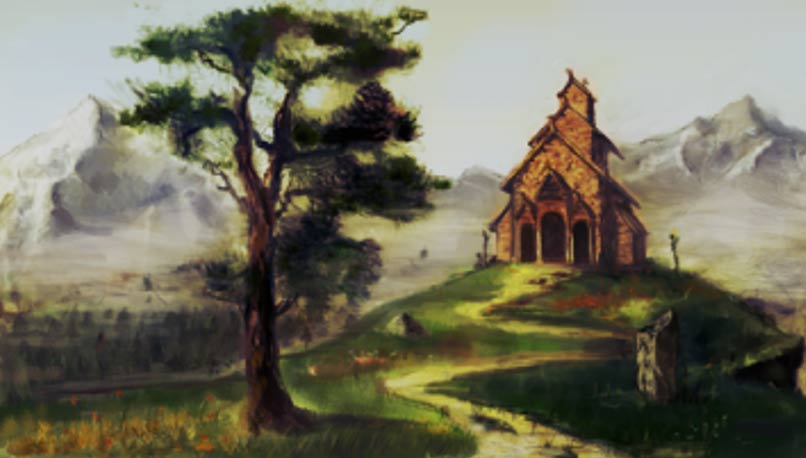Opening the Temple
First, stand at the west side of the altar, facing east. Raise your right hand, palm forward, to salute the divine powers you will summon during the ritual, and say, “In the name of the Aesir and Vanir, I prepare to open this temple.”
Second, perform the complete Lesser Invoking Ritual of the Pentagram to call magical energies into the space.
Third, standing at the west of the altar, facing east, pick up the vessel of water in both hands and raise it up. Say: “Let this temple and all within it be purified with the blood of Ymir.” Go to the east, dip the fingers of one hand into the water, and flick droplets of water in the sign of the Hammer, using three motions, to the east. Go around to the south, and do the same thing; repeat the same action in the west and the north. Return to the east, face east, lift up the vessel of water in both hands, and say: “The temple is purified.” Then go back to the west of the altar and return the vessel of water to its place.
Fourth, standing at the west of the altar facing east, pick up the incense—if you are burning stick incense, just the stick is fine; if you are using cone or loose incense, lift up the burner in both hands. Say, “Let this temple and all within it be consecrated by the sparks of Muspell.” Go to the east and with one hand, draw the sign of the Hammer in smoke to the east. Go around to the south, and do the same thing; repeat the same action in the west and the north. Return to the east, face east, lift up the incense in both hands, and say: “The temple is consecrated.” Then go back to the west of the altar and return the incense to its place.
Fifth, starting from the west of the altar, walk clockwise in a circle around the altar, passing the east three times. Each time you pass the east, bow your head in respect. This is the ancient and very widespread Pagan rite of circumambulation. As you walk, imagine your movements creating a whirlpool of energy that draws in magical power from the far reaches of the universe to your magical temple. When you have passed the east three times, circle back to the west of the altar and face east.
Sixth, spread your arms wide , so your body looks like the rune Elhaz, and say, “Aesir and Vanir, holy gods, I ask you to bless and consecrate this temple of high magic, and aid me with your power in all the work I perform herein.” Pause for a time, and concentrate on sensing your patron deity’s presence and power surrounding you.
Seventh, still standing at the west of the altar facing east, raise your right hand again, palm forward, and say, “In the name of the Aesir and Vanir, and in the presence of all the gods and goddesses, I proclaim this temple duly open.” This completes the ritual.
Closing the Temple:
First, standing at the west of the altar, facing east, pick up the vessel of water in both hands and raise it up. Say: “Let this temple and all within it be purified with the blood of Ymir.” Repeat the process of purifying the temple with water, exactly as you did in the third step of the opening ritual. Then go back to the west of the altar and return the vessel of water to its place.
Second, standing at the west of the altar facing east, pick up the incense and say, “Let this temple and all within it be consecrated by the sparks of Muspell.” Repeat the process of consecrating the temple with fire, exactly as you did in the fourth step of the opening ritual. Then go back to the west of the altar and return the incense to its place.
Third, starting from the west of the altar, walk counterclockwise in a circle around the altar, passing the east three times. Each time you pass the east, bow your head in respect. As you walk, imagine your movements dispersing the whirlpool of energy you created earlier and sending the intention of your working out into the universe to accomplish your will. When you have passed the east three times, circle back to the west of the altar and face east.
Fourth, spread your arms wide so your body looks like the rune Elhaz and say, “ In the name of the Aesir and Vanir, I set free any spirits who may have been imprisoned by this ceremony. Depart unto your rightful habitations in peace, and peace be between us.” Pause for a moment, and then perform the complete Lesser Banishing Ritual of the Pentagram.
Fifth, standing at the west of the altar facing east, raise your right hand again, palm forward, and say, “In the name of Aesir and Vanir, and in the presence of all the gods and goddesses, I proclaim this temple duly closed.” This completes the ritual.



